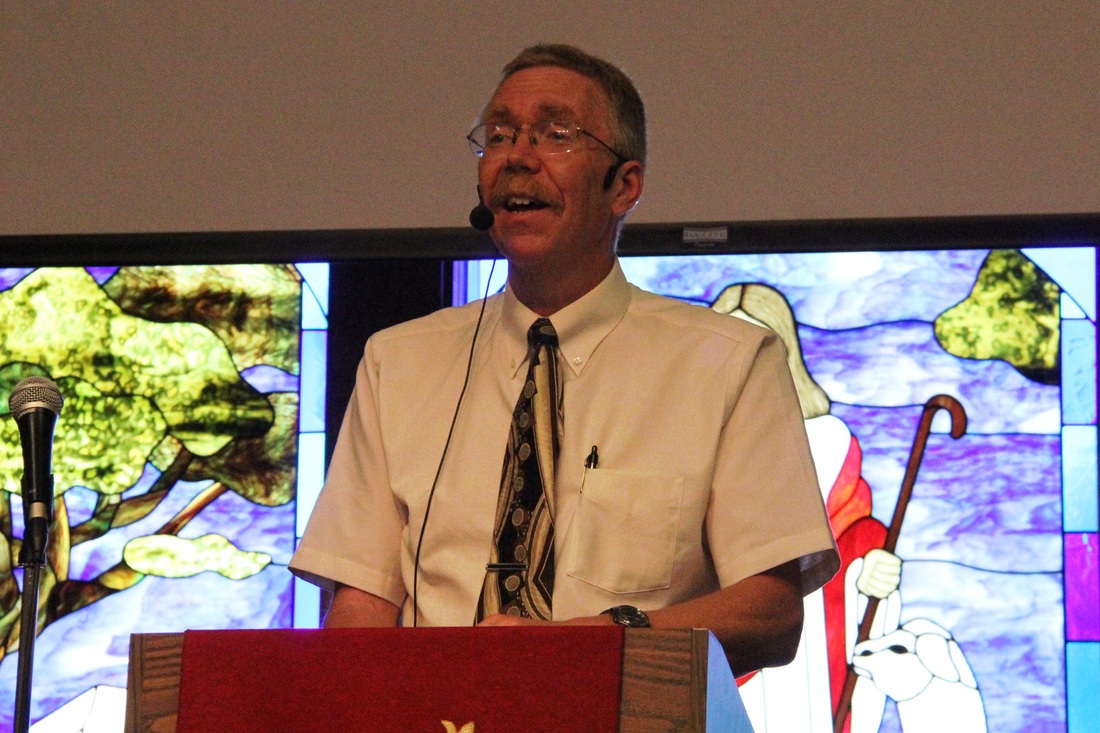
Paul comes to the end of the book of 2 Corinthians. The entire book is devoted to restoring a broken relationship. And now at the end he yields. He has written a letter beginning with compassion, the importance of putting people first, shut up and how up, believing that people can change, admitting weaknesses, focusing on a vision of the future, the motivation of faith, basic communication, redeeming the past, the need to continuing living life well in spite of the broken relationships, fighting with the rules of faith, and now, at the end, he says, “It’s your turn to respond.” Paul takes one more glance into the round-about, not really wanting to stop, but he knows its for the best, and he leaves the entire situation to the people at Corinth. Is there anything harder? Yet if the goal is peace, that is precisely what you must do to find peace in a broken relationship.
You know why God cares so much about broken relationships? Because he knows all about them. The Lord knows the heartache and brokenness of having his people/his creation, whom he loves, rebel, hurt, seek to destroy. Today is Palm Sunday. A most intriguing thing about Palm Sunday is that Jesus Christ enters Jerusalem, people line the streets and sing his praises shouting Blessed is He Who Comes in the Name of the Lord. The people line the streets with a bed of Palm leaves, an entrance of the coming one of God. And only a few days later, it is so difficult to understand the transformation, but Jesus is left for dead on the cross, abandoned by all but a few, even his closest friends, he is mocked and jeered. So why the change? I don’t know, but I do know this: the time had come and Jesus Christ yielded to us so that we are invited to respond to him. Through sin, the world was broken, and God set about to restore the relationship, and he sent his one and only son to point the way, to teach, to perform miracles, and then the time came on that Palm Sunday so long ago, when the Lord said now its your turn, and he yielded to us to respond to him. He puts the ball in our court. The people sing praises and then they reject him. Jesus yielded to us to respond to him as we may.
Jesus yielded to us, both an invitation for us to decide how to respond to him, and an example for us as we yield to others. Paul understood the need to yield, the need to allow people to respond. How do you restore a broken relationship? Learn when to yield, just as Christ yields to us, just as Paul yielded to the Corinthians, not so different from knowing when to stop in a round-about.
1986, two ships collided in the Black Sea off the coast of Russia. Hundreds of passengers died as they were hurled into the icy waters below. News of the disaster was further darkened when an investigation revealed the cause of the accident. It was not a technology problem like radar malfunction--or even thick fog. The cause was human stubbornness. Each captain was aware of the other ship's presence nearby. Both could have steered clear, but according to news reports, neither captain wanted to give way to the other. Each was too proud to yield first. By the time they came to their senses, it was too late.
In the end, you must give up control of the situation. The fight will stop much quicker if you turn it over and say to the other person, now it is up to you. The ball is in your court. You have to know when that time is right. You can call knowing when to yield a six sense, I suppose, at least if you are not a Christian, but I believe it is a gift from the Holy Spirit to know when to yield.
Let’s look a little closer at Paul’s decision to yield. He start winding up his argument really back about 2 Cor. 12:11 (Read). Can you hear the temptation to keep going on, the quick decision in the round-about: “I made a fool of myself, but you drove me to it.” Kinda sorta wanting to defend himself a bit more, but knowing he needs to stop. There is a thing as talking too much and not letting the person you are fighting with get a word in edgewise.
2 Cor. 12:14: “Now I am ready to visit you a third time…” The nervousness in his voice, it is not easy to yield, sometimes it is easier to stay on the defensive, to keep the fight alive, to never end so you don’t get an answer. “I’m coming a third time…” as we continue reading you can almost see the gears in Paul’s mind having to decide, do I yield or do I bull my way into the round-about, the struggle of his mind, the back and forth: 2 Cor. 12:14-19.
When Paul yields he has a bit of fear and trepidation. Of course it can be scary when you yield the floor to somebody, uncertain of how they are going to respond. Confidence is a virtue, yet a bit of fear is not a bad thing. Listen to Paul’s words: 2 Cor. 12:20-21. Even Jesus Christ, in that final week of his life, in the days leading up to what we now call Easter, went to the Garden of Gethsemane and confessed to the Father the uncertainty of what he faced, “Lord, if it be possible, take this cup from me.” As he yielded, in his human nature, Jesus seemed to confess a twinge of uncertainty, perhaps nervousness. To yield to somebody who has just hurt you when you fight with them has its own anxiety, yet it is also freedom to let go, to let go of control, to leave the situation in the hands of another for them to respond. Yet if there is to be reconciliation, the only way to be fully restored, is for the other person to want a renewed relationship. Jesus Christ is saying to us, you must now respond to me.
Paul wraps up his case. 2 Cor. 13:1-3 alludes to one of the specific problems Paul is having with the people. He is coming a third time. At long last, Paul yields the floor to the Corinthians. “Examine yourselves to see whether you are in the faith; test yourselves…” (2 Cor. 13:5). What is the state of your heart? They may choose to reject him still, but his desire is to set the reconciliation squarely in Christ. 2 Cor. 13:6: “And I trust that you will discover we have not failed the test.” That’s the final word, Paul has yielded. Ultimately you cannot control how the other person feels. You cannot dictate reconciliation, for it takes both sides to examine their own heart. Paul says take some time to consider what you really want, and what you really think of me. And Paul yields the floor to the Corinthians.
But there is more. When you yield you don’t just cross your fingers and hope it works out. Look at 2 Cor. 13:7, perhaps the most important words of the entire book, words that are easy to gloss over. In fact, the NIV doesn’t even have a paragraph break. The next five words are no mere formality to Paul, nor should they be to us: NOW WE PRAY TO GOD. Paul yields to the Corinthians for them to examine themselves, and now he PRAYS. Yielding does not mean you never go on… you stop before entering the round-about because of the traffic, but then you are still watching, waiting for an opening, considering. Paul yields to the Corinthians and puts the ball in their court, and now he PRAYS. And what does he pray?
He prays that the Corinthians will do the right thing “not do anything wrong” 2 Cor. 13:7b. Paul prays that they won’t worry about how things look to others, but do what is right and not be stubborn. Paul is laying this out before the Lord, asking God to intercede. When you are in a broken relationship, even when the time comes to yield to the one who has been hurt by you or the one who has hurt you, never stop going to God. Give thanksgiving for what is right with the one with whom you are estranged (read 2 Cor. 13:9). Prayer for perfection of the other, for maturity, and wholeness. You cannot hate a person for long that you pray for. I have a hard time when two people are feuding and they only wish destruction on the other. When you are at odds with another, bless them, want the best for them, love them, and hold them up before the Lord. Even after you yield and leave the next step up to them, pray for their health, their strength, their mind, their maturity.
Some of the great words of scripture, Paul blessing those with whom he is fighting. To yield and to bless is an incredible attitude. Yield and bless. If you are in a tough situation with somebody and you don’t know what else to do, stop the games, say what you need to say, stop the fighting, even tell them now it is time for them to respond, and pray. What an incredible blessing: 2 Cor. 13:11, 14.
Yield. Yield to those with whom you have a broken relationship. Jesus Christ is yielding to you. You, who have sinned. We have all turned away from the Lord. It’s your turn to respond. As we are to bless others and pray for others with whom we are estranged, the Lord blesses us. What is your response? Will you accept him? Will you be reconciled to him? The choice is yours. During the last song, while we are singing, if anyone would like to come forward to pray whether it be a broken relationship with another person, or for your own relationship with Jesus Christ, I invite you to come forward publicly and somebody will pray for you. “May the grace of the Lord Jesus Christ, the Love of God, and the fellowship of the Holy Spirit be with you all.”


 RSS Feed
RSS Feed